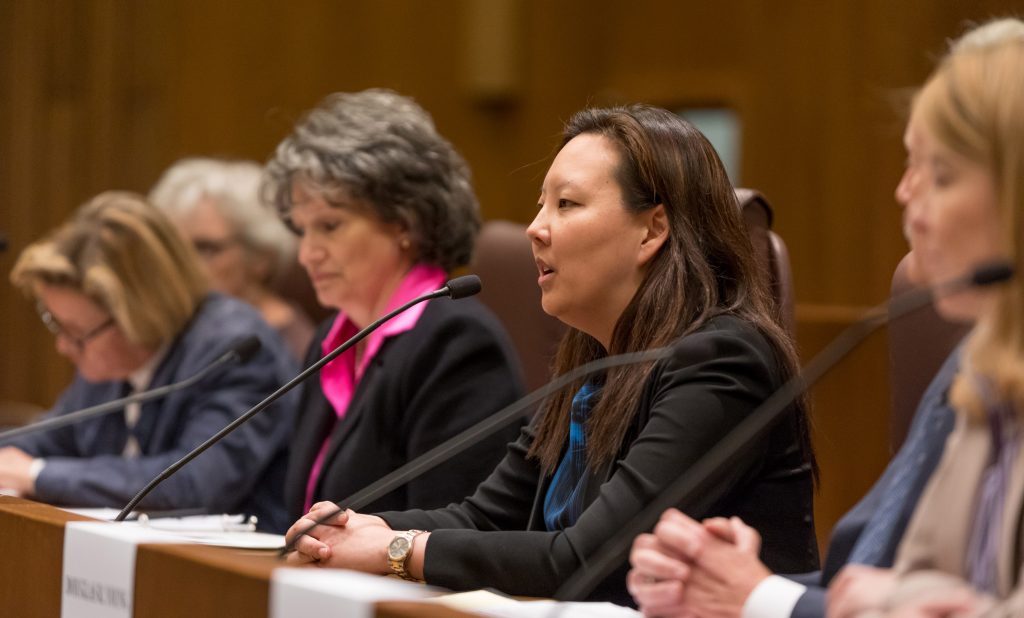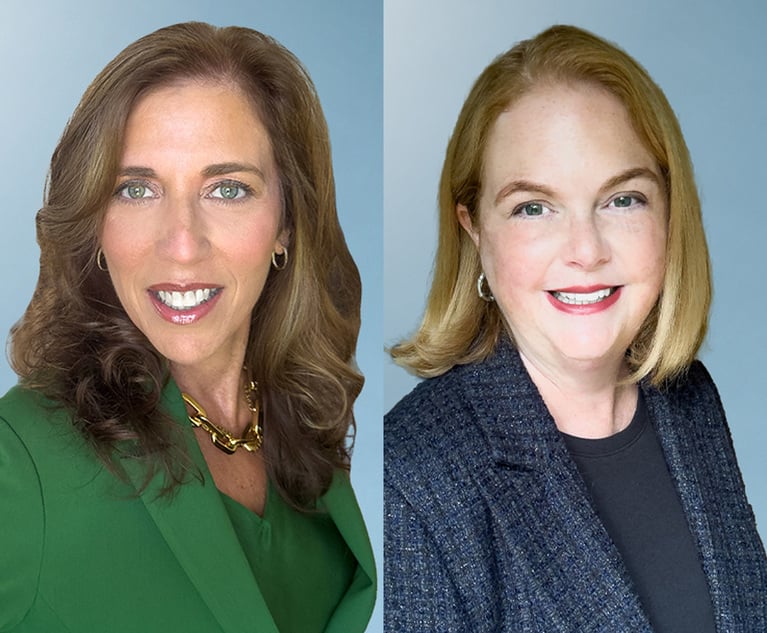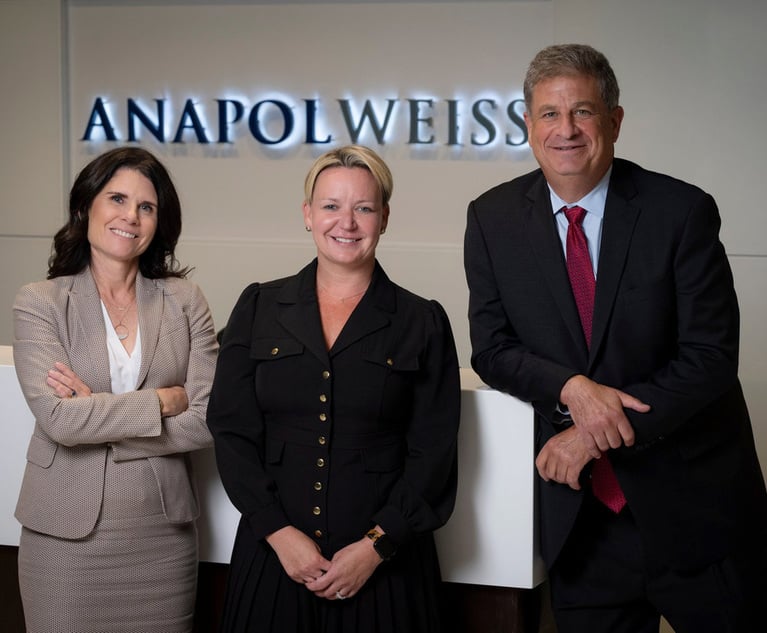Wilson Sonsini Partner Talks About Other Kozinski Clerks 'Waiting, Dying' to Testify in Aborted Investigation
Katherine Ku spoke as part of a discussion called "Making the Future #NOTMeToo" about how women can ward off and respond to sexual harassment in the legal profession.
April 12, 2018 at 08:11 AM
5 minute read

Katherine Ku, who in January became the first former clerk of Ninth Circuit Judge Alex Kozinski still in private practice to publicly speak out about harassment claims about the judge, said she wished she had spoken up sooner.
Ku, a corporate and securities partner in the Los Angeles office of Wilson Sonsini Goodrich & Rosati, spoke Wednesday night as part of a panel discussion called “Making the Future #NOTMeToo!” sponsored by the Women Attorneys Advocacy Project, a group of women from the Bay Area bench, bar and academy who have put together multiple programs addressing issues women face in the legal profession.
In front of a packed crowd of mostly women lawyers in the ceremonial courtroom in the San Francisco federal courthouse, Ku described Kozinski as “an abusive employer” and heaped praise upon Heidi Bond, her fellow Kozinski clerk who was among the first to come forward by name in a December article from the Washington Post accusing Kozinski of harassment.
Ku said she decided to speak out herself after Kozinski abruptly retired late last year, essentially closing the door on the federal judiciary's investigation into his conduct.
“What was so greatly needed in the case of Judge Kozinski was an inquiry—a fair inquiry … into the nature and extent of that problem,” Ku said. She added that former Kozinski clerks who hadn't publically detailed their experience were “waiting, dying to be asked by the committee” to testify “under the protection of a process that was institutionally endorsed.”
“They would have a reason as lawyers to have to speak the truth,” she said.
Ku was speaking in response to questions from Judge Yvonne Gonzalez Rogers of the U.S. District Court for the Northern District of California, who acted as the panel moderator. The panel also included Cris Arguedas of Arguedas, Cassman & Headley; Kelly Dermody of Lieff Cabraser Heimann & Bernstein; Douglas Young of Farella Braun + Martel; and Joan Williams, a professor and director of the Center for WorkLife Law at the University of California Hastings College of the Law.
“What could have existed, what structure-wise could have been in place to have made a difference to you to report this conduct to do something and challenge him?” Rogers asked Ku. “What advice can you give these lawyers?”
Below are three take-aways from Ku and the rest of the evening's panelists:
Be Someone to Be Reckoned With
Arguedas, the lone criminal defense lawyer on the panel, said she often found herself as the only woman in a room full of men during her early years of practice. “Locker room talk” was common in that crowd, she said. “They're a rowdy, raucous, off-color bunch.”
“To me, there are two approaches. One is brush it off and ignore it,” Arguedas said. “In some ways, I felt more powerful doing that.”
The other option, which Arguedas called “equally good or better,” would be to speak up.
Arguedas said that, if you do choose to raise an issue with someone saying or doing something that you disapprove of, “do it with strength.”
“That is the way to actually have them knock it off and to actually see you as someone to be reckoned with,” she said.
Rogers followed up by encouraging audience members to get together and brainstorm about particular situations they might find themselves in, and things they might say to diffuse them.
“You don't want to be surprised someday: It's going to happen to you,” Rogers said. “How many times do you find yourself an hour later coming up with something and saying to yourself, 'God, I wish I would have said that! That would have been a great zinger?' What I'm suggesting is that you do that now,” and have the comeback ready, Rogers said.
#MeToo Due Diligence
Williams of UC Hastings said that law firms, in particular, have had trouble addressing harassment in their ranks, especially “when somebody is a major rainmaker and has a multimillion-dollar book” of business. Even complaints in such circumstances can lead to a partner quietly leaving one firm, only to be hired by another, she said.
Williams said, as a “risk management” matter, firms have to be more careful about due diligence on lateral hires. “The risks of employing a sexual harasser have very sharply increased over the past year,” she said.
Rogers, who heads up the Northern District Criminal Justice Act Panel hires private lawyers to handle indigent defendants' criminal cases, took the opportunity to ask the lawyers in the crowd to inform her if and when any panel lawyers behave inappropriately.
“I want to know about defense lawyers who the court has hired to represent defendants,” she said. “We don't have to hire people to represent defendants if they're misbehaving.”
First Things First
Ku, toward the conclusion of the panel, said she believes that “all of us can keep propelling toward fairness and correct results by speaking.”
But, she said she realized that after reading Heidi Bond's blog post about Kozinski that her fellow clerk had “internalized” a lot of trauma.
“It tears at the heart to see someone living with that much hurt,” Ku said. “I think, if you're an individual and you have been traumatized, just take care of yourself first. … Taking care of yourself first is the most important thing.”
This content has been archived. It is available through our partners, LexisNexis® and Bloomberg Law.
To view this content, please continue to their sites.
Not a Lexis Subscriber?
Subscribe Now
Not a Bloomberg Law Subscriber?
Subscribe Now
NOT FOR REPRINT
© 2025 ALM Global, LLC, All Rights Reserved. Request academic re-use from www.copyright.com. All other uses, submit a request to [email protected]. For more information visit Asset & Logo Licensing.
You Might Like
View All
Once the LA Fires Are Extinguished, Expect the Litigation to Unfold for Years
5 minute read

Faegre Drinker Adds Three Former Federal Prosecutors From Greenberg Traurig
4 minute read
Anapol Weiss Acquires Boutique Led by Star Litigator Alexandra Walsh
5 minute readTrending Stories
Who Got The Work
J. Brugh Lower of Gibbons has entered an appearance for industrial equipment supplier Devco Corporation in a pending trademark infringement lawsuit. The suit, accusing the defendant of selling knock-off Graco products, was filed Dec. 18 in New Jersey District Court by Rivkin Radler on behalf of Graco Inc. and Graco Minnesota. The case, assigned to U.S. District Judge Zahid N. Quraishi, is 3:24-cv-11294, Graco Inc. et al v. Devco Corporation.
Who Got The Work
Rebecca Maller-Stein and Kent A. Yalowitz of Arnold & Porter Kaye Scholer have entered their appearances for Hanaco Venture Capital and its executives, Lior Prosor and David Frankel, in a pending securities lawsuit. The action, filed on Dec. 24 in New York Southern District Court by Zell, Aron & Co. on behalf of Goldeneye Advisors, accuses the defendants of negligently and fraudulently managing the plaintiff's $1 million investment. The case, assigned to U.S. District Judge Vernon S. Broderick, is 1:24-cv-09918, Goldeneye Advisors, LLC v. Hanaco Venture Capital, Ltd. et al.
Who Got The Work
Attorneys from A&O Shearman has stepped in as defense counsel for Toronto-Dominion Bank and other defendants in a pending securities class action. The suit, filed Dec. 11 in New York Southern District Court by Bleichmar Fonti & Auld, accuses the defendants of concealing the bank's 'pervasive' deficiencies in regards to its compliance with the Bank Secrecy Act and the quality of its anti-money laundering controls. The case, assigned to U.S. District Judge Arun Subramanian, is 1:24-cv-09445, Gonzalez v. The Toronto-Dominion Bank et al.
Who Got The Work
Crown Castle International, a Pennsylvania company providing shared communications infrastructure, has turned to Luke D. Wolf of Gordon Rees Scully Mansukhani to fend off a pending breach-of-contract lawsuit. The court action, filed Nov. 25 in Michigan Eastern District Court by Hooper Hathaway PC on behalf of The Town Residences LLC, accuses Crown Castle of failing to transfer approximately $30,000 in utility payments from T-Mobile in breach of a roof-top lease and assignment agreement. The case, assigned to U.S. District Judge Susan K. Declercq, is 2:24-cv-13131, The Town Residences LLC v. T-Mobile US, Inc. et al.
Who Got The Work
Wilfred P. Coronato and Daniel M. Schwartz of McCarter & English have stepped in as defense counsel to Electrolux Home Products Inc. in a pending product liability lawsuit. The court action, filed Nov. 26 in New York Eastern District Court by Poulos Lopiccolo PC and Nagel Rice LLP on behalf of David Stern, alleges that the defendant's refrigerators’ drawers and shelving repeatedly break and fall apart within months after purchase. The case, assigned to U.S. District Judge Joan M. Azrack, is 2:24-cv-08204, Stern v. Electrolux Home Products, Inc.
Featured Firms
Law Offices of Gary Martin Hays & Associates, P.C.
(470) 294-1674
Law Offices of Mark E. Salomone
(857) 444-6468
Smith & Hassler
(713) 739-1250






